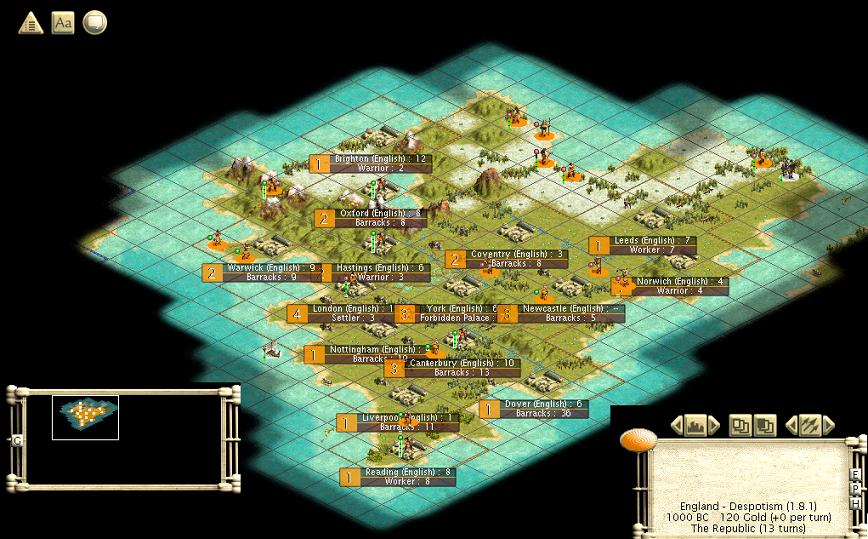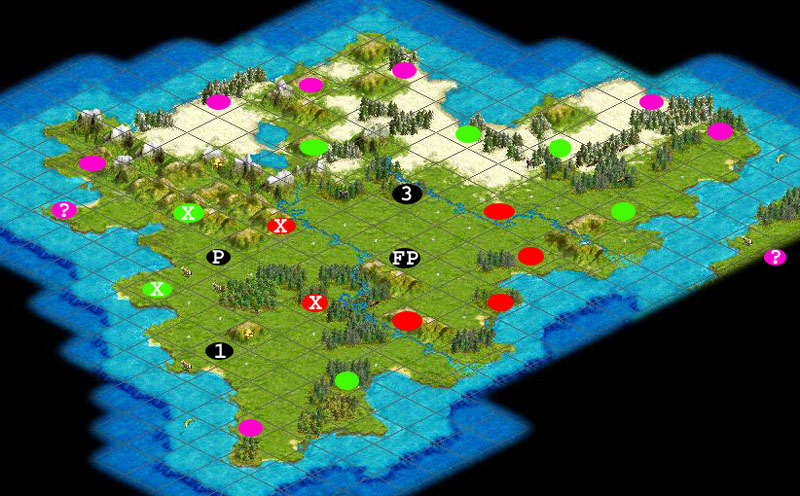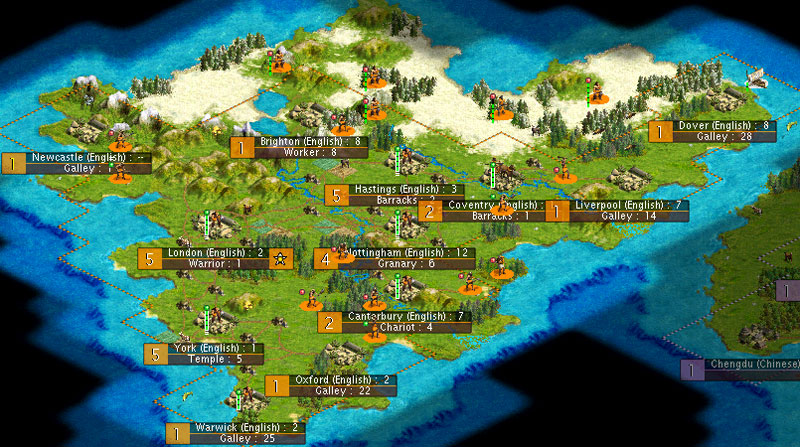![PTW Icon [ptw] [ptw]](/images/smilies/ptw.gif) Open Class.
Open Class.My goal for this GOTM will be either space race or diplomatic. Haven't decided yet. It'll probably be diplo if I run short of time (fewer wars = easier to make gracious, fewer techs to research) and space if I don't (because all else being equal, I *am* a warmonger, and because I like the spacerace movie.
 )
)As such, my number one priority has been, and will continue to be, a fast tech pace. In short, that means:
- pushing research myself whenever practical
- saving up money for trades and building scientific infrastructure whenever not
- building a forbidden palace as early as possible in a good location
- getting and trading contacts ASAP to drop tech prices
- keeping the AI smart and happy (donating techs and luxes outright to laggards, and avoiding selling for gpt whenever possible)
- making good use of any scientific AIs that might be in the game
All that in addition to my usual goals of territory and population building, and warmongering. Piece of cake! I've never pushed research as hard as I plan to at such a high level, so it should be wild trying to keep up!
So with that decided, it was on to the game.
During the pregame phase, I had decided to settle one tile SW by the cows unless a scout move east to the river revealed a food bonus. I wanted a settler factory up and running as soon as possible in order to colonize as much land as possible as fast as possible. Since I'd be doing a 40-turn minimum run on writing, I figured the lack of cash early on from working unimproved tiles while irrigation was brought to the cows would not be critical. If I could get to mapmaking fast enough, I guessed I'd have more than enough opportunity on an archipelago map to trade for the techs and cash I'd need to get up to speed scientifically. I didn't consider trying for the Lighthouse, gambling I'd be able to make the needed contacts without it, and preferring both to use my shields on other things, and to avoid the early golden age.
There was one consquence of a strict writing-mapmaking research path that I didn't consider until later: if I was in fact alone on an island, I wouldn't have any archers to deal with Emperor-level raging barbs. This did greatly affect my game plan later on.
But back at the start, I was still blissfully ignorant of that consequence. Since the scout found nothing of interest (except lots of bonus grasses to make me start considering that area for a nice Forbidden Palace), I settled London in 3950 BC by the cows as planned, and set research to writing while my worker set about irrigating the regular grass tiles between London and the river.
I spent about twice as long planning the initial 20-30 turns as I usually do. I finally decided to build a warrior and worker out of London before the granary, the warrior for MP and the worker to get the necessary mines built so London could start on settlers right away. If things had gone as I'd originally planned, London would have built its granary on turn 26 at size 4 with a granary exactly full, in perfect position to start building 4-turn settlers right away. Due to the inevitable mistake in my worker plans it didn't quite work out this way -- it worked out better! The granary was built on turn 25, with London still at size 3 but with 5 food above the line, and I found out I could actually run the factory from size 3.5 to 5.5 instead of the planned 4-6. Considering the high lux taxes I was running with my early lack of MPs and only one lux on the island, I was quite happy with this. So London built its granary in 2750 BC, and then built a settler every four turns until the revolt to Republic.
My scout, meanwhile, headed east initially, finding the coast in only 3800 BC, then looping south and west to explore the south coast. While the scout discovered the Chinese island off across the strait, there was no one there yet to say hello.
 So it was on to explore the rest of the west coast, then up to the northwest (seeing German borders, but too far away to see any units on land) and the northeast before looping back down into the far east again.
So it was on to explore the rest of the west coast, then up to the northwest (seeing German borders, but too far away to see any units on land) and the northeast before looping back down into the far east again.I had been considering trying to run dual settler factories from the start, and finding the third cow south of London (two 4-turn factories!) made that idea extremely tempting. But then I saw how diabolical the map-builder had been! All of the possible tiles I could have used had something wrong with them. One was a tile away from the coast. Another was a bonus grass -- settling there would've robbed me of the shields I'd've needed to make 4-turn settlers possible. Another would've required a cultural expansion or another city to reach the southern cow. I was also looking at the possible sites for my 3rd and following cities. RCP-3 turned out to be (I exaggerate only slightly) bonus grass bonus grass bonus grass mountain mountain mountain. Blech! So I gave up the dual 4-turn factory idea, putting York 3 tiles due south and rationalizing I'd need warriors for MP and barb-fighting more than I'd need extra settlers anyway.
York's settler was sent south to the city site in 2590 BC and promptly spotted my first barb camp two tiles further south. So warriors it was! On the same turn, my scout, now in the far east a few tiles NW of the furs, walked into a barb camp on its first move. I decided to keep the scout out there as long as possible, hoping to use it as a distraction to keep the barbs away from my cities. I think this may actually have worked. Very few barbs threatened my eastern cities as they were settled, many fewer than I would have expected considering the raging barbarians setting. I got to play footsie with them out there for millennia.

I was sacked only three times, in both York and Nottingham two turns after their respective foundings, for cash, and in York again in 1910 BC, for population, after I'd sent two warriors out of the city to attack a camp near there the same turn barb horsies showed up. The camp died, but so did both warriors, leaving the city open to the red-lined barb horse. That was about the end of it, though; I had the map pretty well lit up shortly thereafter, although it took a heck of a lot of resources devoted to warrior builts to accomplish it. I'd have much rather had a few archers, but it didn't work out too badly in retrospect. Total death toll on land was four or five warriors and eventually my scout, but no workers or settlers. On sea, it was a different story, but more on that later.
Writing was learned right on time in 2110 BC, and research was set to mapmaking at best speed. (Turned out to be 24 turns.) Ironically, on the very same turn I spotted my first barb galley. Eek! The AI already had maps! I persisted with my plans, though, knowing that the AI stunk at exploration and hoping I could get my galleys out fast enough to steal the contacts anyway. Within the next 10-12 turns I started on galley pre-builds in three of my newish coastal towns, intending to pop-rush: one in my farthest eastern town fairly close to the landmass there, one a couple of towns west along my south coast, and one near the German border I'd seen. York also got a galley pre-build as mapmaking got closer, to build by hand.
Mapmaking was finally learned in 1375 BC; I switched research off, anticipating trades. The three towns pop-rushed immediately, and York would build a fourth galley two turns later. I found Germany first, in 1350 BC, moderately worried to find out I was hopelessly behind in tech -- they still didn't even have alphabet! Wheee! I decided to see if I could find another civ quickly to bring down the cost of their techs, so waited another couple of turns while my eastern galley headed down the coast of the landmass there and my southern galley headed southwest along my southern coast. In 1300 BC I both met China and found the passage to France, so I waited one more turn, until 1275 BC, before trading. China didn't have alphabet either. [dance]
This was a banner year for England. The haul:
Bronze-working, The Wheel, CB, WC, Masonry, Mysticism, IW.
Contact with a 4th civ.
World maps of all four civs.
221g (in other words, everything they had).
Contacts and missing techs were gifted all around, with one exception: China and Germany did not get mapmaking until later, after my galleys had already passed by their territory. (Civ 4, like France, already had maps.) Research went back on, to CoL at max, and the galleys pressed on.
I had severe problems with barbarians on the oceans. I built or poprushed a total of five galleys in the QSC period, but at 1000 BC had only two left (all three lost to barbs, not sinking). Two of the three were lost attacking at full strength, where the odds were substantially in my favor. Despite that, though, I found a fifth civ in 1125 BC and the sixth in 950 BC. The seventh contact took a small eternity to get and cost me another galley, IIRC, but I did manage it before the end of the ancient age.
More techs: HBR in 1125 BC, from Civ 5. CoL in 1025 BC, self-researched. Math in 1025 BC, from France. Philo in 900 BC, self-researched. Lit and Poly in a 2-fer in 750 BC, aided by trading contact with Civ 6. Republic in 530 BC, self-researched. Currency, Construction and my first middle ages tech in 430 BC, aided by selling contact with Civ 7 and by the fact that both scientific civs drew the same free tech.
Up until the last ancient age trade I had generally been gifting everything to everybody immediately, or at worst, within a few turns of its discovery. This practice ended here. Germany did not get Republic. China did not get Republic, currency or construction. Why? They're the nearest two civs. One or the other of them will be attacked as soon as I have knights and the boats to transport them, and if I can manage it, the other will follow once I have cavs. So it was time to start cutting them out of the tech giveaways. (I do not plan to completely eliminate Germany, just to take most of their land and remove them as rivals.) Whether or not I can actually accomplish this is another matter; the AI tech pace is about to skyrocket compared to my ability to keep up, and I have tons of infrastructure to build or buy that may have to take priority over military. I do have a beachhead, Norwich, on the northern end of the Chinese island, which should help in any invasion. I also had a town on the German continent, but that is gone now ("now" being a few turns into the middle ages); Germany threatened and I had to abandon. I have a town planted next to some iron on an island I won't be able to trade with until Astronomy; that should be some insurance against losing the single source on the home island. I also have a boat ready to carry a settler to an attractive area not too far away that's been too barb infested for anyone to settle, but a French outpost in the same area should've absorbed most of the horses from the uprising by now.

Happiness continues to be a problem. I had my first harbor built within the QSC period, but it took until 530 BC for me to be able to purchase my first lux, and there have been no more up to now. The Lighthouse was built by a civ with a coastal connection to me already, so no help there. So growth has been slower than usual, and lux taxes higher.
Despite that, I'm very happy with the way my ancient age went. For about the first time ever, I was able to plan ahead significantly, and stick to my plan mostly successfully. I've mostly kept on top of my critical micromanagement needs.
QSC stats to the extent I remember them or wrote them down; more later when I add the pretty pictures:
Towns: 14, one more than I'd ever managed before in the same time period.
Citizens: 30-something? Most of my towns were pretty small still, and I'd recently pop-rushed in three towns.
Workers: 11. Much MUCH better than last GOTM. Go me.
Gold: Don't remember exactly; will have to look.
Territory: most of my starting island, plus Norwich on the Chinese island
Warriors: 15-20, I think, all but one regular.
Galleys: 2


 for the lost ones
for the lost onesLuxes connected: 1, naturally
Resources connected: 0, I think.
Contacts: 5, no embassies
Techs: Most AA, but not lit, poly, philo, currency, construction or the governments. Early tech pace quite slow due to archipelago.
Improvements: just a granary and a harbor
Finally, the forbidden palace was completed in Nottingham, E E SE of London, in 710 BC, so I'll be in good shape to move the palace if a leader should arise at any point.
It's really going to be a wild ride from here on out. On to the middle ages!
Renata

 I was able limp it along to a finish...somewhere between 20-40 crashes in total (dunno, lost count).
I was able limp it along to a finish...somewhere between 20-40 crashes in total (dunno, lost count). ![Mac Civ3 Icon [civ3mac] [civ3mac]](/images/smilies/macciv3.gif)
![Civ3 Icon [civ3] [civ3]](/images/smilies/civ3.gif) Open Class
Open Class





 )
) )
)




